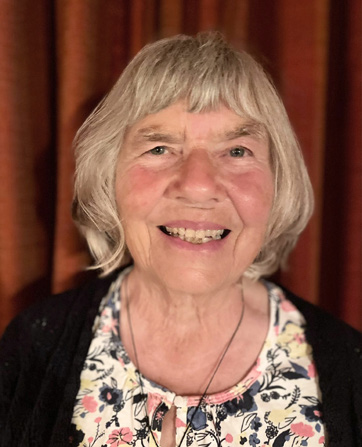Stories are ‘comfort food for our souls’
2022 has been designated the Year of Stories in Scotland. Jackie Macadam learns about the importance and power of stories and storytelling for the Church of Scotland.
Picture the scene. It’s evening, the light outside the window just at that stage where it’s losing the battle against night and the sky is lit up with streaks of red, blue and grey. Darkness is just around the corner. A family is gathered around the kitchen fire, dad in the easy chair, mum closing the curtains to signal the end of the day and as dad reaches down to the side of the chair, the children, knowing what’s about to come, gather in and wait expectantly around him, their faces catching the rosy glow from the fireplace. Dad puts the book on his knee, opens to the page with the marker, and asks: ‘Where were we?”
If any of you reading that paragraph saw the sky in your own mind, felt the heat from the fire, smelled the smoke, then you have just experienced the power of stories.
Stories shape who we are and what we might become.
The Rev Russell McLarty recently retired as a Church of Scotland minister but remains active as a storyteller and member of the Scottish Storytelling Forum.
“The stories we carry with us are absolutely vital in the way they shape who we are and what we might become. This holds true at every level in life whether as individuals or groups, as congregations and communities, as nations or as a world community. The community theologian, Ann Morisy, spoke of ‘story thin people and story rich people’, suggesting that we might all aspire to have wonderful, positive stories to share and inspire others. Some, however, may have little to speak of and that is very sad. Over many years I have shared stories and helped people in story-making in schools and clubs, in churches and in prison, in drug rehab and on retreats. It has been really encouraging to see how people of all ages and all backgrounds can respond in very positive ways. Stories grab them and help develop a better attention span.
“Jesus, the great storyteller, would have loved this idea of a Year of Stories in 2022 and over the years I have enjoyed helping people ‘tell the Jesus story’ rather than reading from the book. Originally the stories of Jesus would have been passed on by word of mouth before being written down in ink on papyrus and 21st century Biblical Storytelling looks to reclaim some of this energy. There is an immediacy, intimacy and sense of ownership with that ‘eye to eye, mind to mind, heart to heart’ engagement of Biblical Storytelling.”
Daniel Abercrombie is Programme and Events Manager with the Scottish Storytelling Centre and Associate Director of the Scottish International Storytelling Festival.
“One of the first things I learned when I joined the Scottish Storytelling Centre in 2010, was that a story is never told to an audience, it is shared with them, ” he said.
“The audience can then take that story and share it with other people, possibly putting their own take on it, or positioning it within their own culture or experiences. I have shared in that experience more times than I can remember, often hearing stories from international guests that are the same tales that I’ve heard from Scottish storytellers, but with each having their own cultural variations and colloquialisms. It is a lovely thing to encounter and a reminder of our universal connection through stories. There is a two-way relationship between the audience and the performer, with no barrier between the two. The audience are central to the experience and a good storyteller will adapt and respond to the people they see in front of them, in a shared experience,” he says.
He’s particularly glad that this year has been selected as Scotland’s Year of Stories.
“2022 is Scotland’s Year of Stories, a themed year initiative led by VisitScotland. Stories are to be celebrated across the country as a vital part of Scotland’s culture, where every community has a different tale to tell. This year gives us all the chance to pause and reflect on the importance of the stories we tell each other, as well as the stories we tell ourselves.

Photo: iStock
“Like many people, my first experiences of storytelling as a live artform would have been religious stories, in my case at the local Church Sunday School in Edinburgh. The bible stories we were told are the perfect example of that two-way relationship, where the minister or teacher would share stories with the congregation who in turn take that forward in their own lives. I can still visualise the imagery conjured up in those early stories. Any metaphor or message in a story can sit within you and affect your life, but the imagery is also something we can individually tap in to. Stories can have a wonderful impact on your imagination, it is not just the payoff or the punchline, but the journey your imagination goes on which creates the special, lasting moments.
“At the Scottish Storytelling Centre, we have an open policy to programming and the way people can engage with the space. We aim to encourage the community around us to not only use the building, but actively develop and explore their own creativity within it, be that through workshops, open-access storytelling events, or as audience members who take something creative and spiritual away.“
The lockdown necessitated a different approach from the SSC and threw up some interesting ideas.
“The lockdown years have been challenging of course, but we have seen that storytelling can flourish online. We now host many online story sessions where people can connect from all over the world, which has been a lovely benefit. However, it has brought into focus again the importance of the audience and it makes me think of our relationship with social media and modern interpretations of the way we tell stories.
"Jesus, the great storyteller, would have loved this idea of a Year of Stories in 2022 and over the years I have enjoyed helping people ‘tell the Jesus story’ rather than reading from the book.
“Social media in particular can lack that two-way understanding that live, human interaction offers. It also highlights the importance of listening in a conversation, something often lacking in social media discussions. Live oral storytelling is perhaps a unique experience in the modern world, where it relies upon all participants to open themselves up to being part of the experience. This is why stories are vital in our world, there is an element of getting back to basics within storytelling, where people can understand each other and connect with each other. Maybe this is the main thing we have learnt from the past two years, that humans need connection, we need to engage with each other, listen to each other, respect each other and share our stories and experiences in an open and welcoming environment.”

Daniel Abercrombie, Programme and Events Manager with the Scottish Storytelling Centre and Associate Director of the Scottish International Storytelling Festival
"Like many people, my first experiences of storytelling as a live artform would have been religious stories, in my case at the local Church Sunday School in Edinburgh. The bible stories we were told are the perfect example of that two-way relationship, where the minister or teacher would share stories with the congregation who in turn take that forward in their own lives.
The Rev Sarah Brown, minister at St Machar’s Cathedral in Aberdeen has a keen interest in storytelling.
“Storytelling in ministry has been an interest of mine since I was involved with youth work,” she says.
“My first experience of thinking about the power of storytelling was at a workshop at the Greenbelt Festival, a Christian festival that explores the arts. At that session the speaker started by saying wasn’t it awful when your minister tells that story you’ve heard a hundred times before, and everyone groaned. He then said: ‘Like this one. On the night on which he was betrayed…’ and everyone stopped groaning. He spoke of how story shapes us as a people and well told stories can be repeated often, daily in fact, and their richness speaks to us and forms who we are as individuals and as part of a community.
“Having attended a couple of storytelling sessions at the Scottish Storytelling Centre, I learned the techniques of how to tell a story, how to take the bare bones of a story and flesh it out to engage the listeners. My favourite ones are those that can take the people in the room and place them in the story, so that they become more invested in what they are hearing. They become the story. And from requests year on year from young people to tell a story around the campfire, they hold those stories in their hearts,” she says.
“The best thing we are told we can do for our children is read or tell them stories. The current climate is to protect children from difficult stories that contain violence, but traditionally children’s stories had an element of pain or violence or death that was to be overcome and stories taught children how to develop that problemsolving ability themselves.
“We draw on the characters we meet in stories. We liken them to ourselves, or fashion others into them and we work out ways to be the heroine or to befriend the dragon. I’m not sure we ever lose that fascination with story, I hope we don’t, as firing up our imaginations helps us to connect more deeply with how to live more fully.”
Margaret Silf has spent her life with stories. She’s an author, retreat leader and spiritual explorer.

Margaret Silf, author, retreat leader and spiritual explorer

The Rev Russell McLarty, retired Church of Scotland minister, active storyteller and member of the Scottish Storytelling Forum

The Rev Sarah Brown, minister at St Machar’s Cathedral in Aberdeen
“‘Are you sitting comfortably? Then I’ll begin’. This is how the children’s radio programme ‘Listen with Mother’ opened, back in the 1950s when I was very young. It’s ancient history now of course as I trundle my way through my eighth decade, but it tuned me in to the power of stories from a very early age,” she says.
“I live in North Ayrshire, but my roots stretch south to Yorkshire on one side and up to the north-east of Scotland and the Northern Isles on the other. Story-telling is in my DNA, but I never realised this until people began to comment on it. Once it was pointed out, I could see that stories are simply the way my mind works. It’s a bit like Monsieur Jourdain in Molière’s The Bourgeois Gentleman who was so surprised to learn that ‘these forty years now I’ve been speaking prose without knowing it.’ For me, it’s like that with stories.
“Stories are how we make sense of life,” she says. “They help us understand ourselves and how to relate to each other, where we come from, where we are going, and how it all connects with the great mysteries of existence. Children love them. Grownups get goose-bumps when a story touches their hearts. A story speaks to you wherever you are, at whatever age and stage of your life, and whatever mood you’re in. It’s an open door, leading to a different destination for everyone who goes through it – encouraging, challenging, consoling, warning, befriending, expanding our vision, signposting the path, and nourishing us along the road. A story can bridge the chasms between us, whether political, theological or social. Never is this power more important than in periods of disruption, polarisation, crisis and transition such as we are experiencing right now.
“Jesus used stories, or parables, all the time. They connect our familiar world to the realities beyond our understanding. They connect history to mystery, the personal to the universal, the human to the divine. When Jesus told his stories the smallest children were spellbound, the least educated ‘got it’, while the greatest minds struggled. He even praised God for concealing the mysteries from the clever and the powerful and revealing them to little children (Matthew 11:25-30).
“I’ve seen the magic at work on the occasions when I’ve been asked to give a homily,” she says. “The faces of bored children and distracted adults light up when you say the simple words ‘This reminds me of a story.’ You can almost see the ears prick up and the interest re-engage. Jesus knew this better than anyone, which is why he so often chose to communicate his truth through a wealth of stories.
“What makes us love stories so much? They let us relax and become receptive to new possibilities. They stretch our imaginations to explore new ways of being more fully human. They make us think.
They are comfort food for our souls, even though their message is sometimes far from comfortable. They don’t threaten us or harangue us or preach at us, but subtly guide us, even when they sometimes shock us. They give us space to find our own meanings by reminding us of our shared human experience and connecting it to the deepest meanings of life. Quite simply, we enjoy them, and that, surely, is the secret of their power to change us and to change the world. So, are you sitting comfortably?”